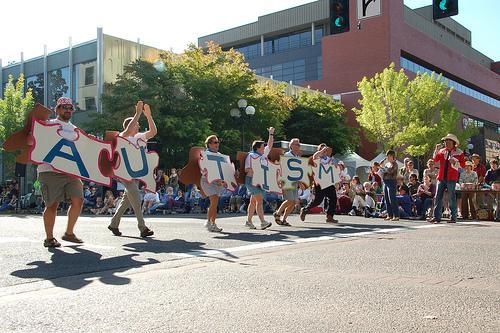About one in every 150 American children is diagnosed with autism, according to WebMD. Chances are, you know someone who has an autism spectrum disorder (ASD) or someone who is affected by it. Autism awareness grows every year, with advocacy groups and benefit walks springing up regularly across the nation. But we still don’t really understand a whole lot about it. We don’t know the cause, although numerous factors are suspected to contribute to it. And there is no cure for it, either.
Autism can result in many different symptoms – from behavioral problems to sensory defensiveness to social difficulties. Children with ASD also tend to display speech and language issues. Some of them are nonverbal and prefer to communicate with gestures. Although there is no cure for autism, researchers do know that early intervention is critical. Children who receive speech therapy and other treatments tend to respond better when the treatment begins as early as possible. Unfortunately, most cases of autism aren’t diagnosed until symptoms are evident around the time the child is 2-3 years old. This is why the research from Georgia Tech’s Center for Behavior Imaging is so exciting. Researchers have been working on technologies that would allow for earlier detection of ASD, and subsequently, earlier treatment.
Tracking Eye Movement
Children with ASD typically display a reluctance to make or maintain eye contact with other people. Previously, researchers had the labor-intensive task of sorting through countless video frames to measure the eye contact of an autistic child. The researchers at Georgia Tech have developed a special pair of eyeglasses that can do the same thing automatically.
The eyeglasses are worn by an adult, who then interacts with the child. The eyeglasses are equipped with a front-facing camera that records video. The video is then analyzed by facial-recognition software that detects the direction of the child’s gaze. An experiment with the glasses demonstrated an accuracy of 80%.
Accelerometers for Behavior Detection
The researchers at Georgia Tech also developed technology to track behavioral patterns that can be indicative of autism. This technology is a wearable device that uses accelerometers to track and categorize behaviors. The sensors are worn on the wrists and ankles in order to measure movement. For example, the device tracks when a child throws an object.
Four staff members tested the device by performing 1,200 different behaviors (presumably, that included throwing things around). Not only did the staff members have a really interesting day at work, they were able to determine that the device detected problem behaviors with 95% accuracy and classified all behaviors with 80% accuracy. The researchers then placed the device on a child diagnosed with ASD. Problem behaviors were detected with 81% accuracy and classified with 70% accuracy.
So what does all that research mean for your child? The technology is still new; don’t expect it in your local clinic any time soon. But it is certainly promising that autism diagnostics are going high-tech. The earlier a child can get help, the more effective the treatment is likely to be. This holds true for other speech disorders, as well. If your child has problems with articulation or other communication issues, have him evaluated by a speech-language pathologist. If he does need help, the SLP can also recommend speech therapy activities to do at home with your child, such as using Speech Buddies to improve articulation.







